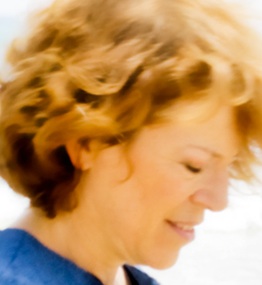 Local folk singer extraordinaire Sandy Cash didn’t set out to become an ambassador for Israel through music. She originally fancied a career as a rabbi. But 25 years in the Middle East have transformed the talented singer-songwriter and, with the release of her fourth CD, “Voices from the Other Side,†Cash’s musical message of hope, tempered with some hard truths, has the potential to reach even more receptive listeners than if she was the next Rabbi Ovadiah Yosef (although the latter is probably funnier).
Local folk singer extraordinaire Sandy Cash didn’t set out to become an ambassador for Israel through music. She originally fancied a career as a rabbi. But 25 years in the Middle East have transformed the talented singer-songwriter and, with the release of her fourth CD, “Voices from the Other Side,†Cash’s musical message of hope, tempered with some hard truths, has the potential to reach even more receptive listeners than if she was the next Rabbi Ovadiah Yosef (although the latter is probably funnier).
Full disclosure: I first met Sandy Cash when we worked together in Jerusalem some 18 years ago and we have remained friends ever since. We hosted her for a house concert around the time of the release of her first album, “Exact Change,†in 2000. And we caught her live last week for a launch party at a club near her home in Beit Shemesh. None of that changes my appreciation for her musical evolution.
And an interesting evolution it’s been. Cash was a Judaic Studies major at Yale, she says, because she thought about becoming a rabbi in the Reform or Conservative movements at the time. But by the time she graduated, she’d become more religious, enough so that – in a rabbinical twist on the old Woody Allen joke – she wasn’t sure she’d want to belong to the kind of community where she could be a rabbi. She came to Israel instead and realized “I didn’t want to be a professional Jew. Maybe I just wanted to be here,†she says.
Her next big dream, also to be subtly subverted, was to become an actress on the Hebrew stage. She enrolled in Tel Aviv University’s drama program (“it was like a very high levelulpan,†she says) but realized that acting on stage, she’d “always be thinking about dikduk†(grammar). She was cast as a chorus member in Les Miserables in Tel Aviv and later performed in a number of Israeli musicals including Evita with Israeli pop star Riki Gal.
Now fully comfortable on stage as part of a company, she wanted to be up front too. So, she taught herself guitar (she had played piano and sung growing up) and began composing her own material. “It was a way to get my theatrically oriented songs on stage without having to collaborate with anyone,†she jokes.
She started off by scouring the folk music world for “every funny intellectual song I could find.†She then added in her own ironic songs, which drew on her experience raising four children in the pressure cooker we call Israel. She calls the result “standup comedy with guitar.â€
Four albums later, there’s still a light touch and humor in her music, but a seriousness has crept in too, the result of a songwriter who is coming into her own and, with two of her kids either in or about to go in to the army, has more to share than other singers’ ditties about bridesmaids and Viagra (although those are still in her repertoire).
She’s now doing something “I’ve never done before,†she says: “Using my music to give voice to the modern Israeli experience. Using a very personal lens – and staying away from specific political prescriptions – I want to help people across the pond understand what it’s like for me to live here.â€
This focus came about in part during tours she’s done in the U.S. where she’s found herself “surprised to be in the position of a spokesperson for Zionism.â€
Two songs on the album stand out in this light: “Freeze Frame Truth,†which tries to present a fraught, balanced snapshot about the reality of a 19-year-old Israeli soldier put in the uncomfortable position of having to search the trunk of an young Palestinian woman’s vehicle for a bomb at a checkpoint; and “A Song of Zion,†which somewhat more politically chastises those who habitually criticize Israel out of “love†until the time when they can finally embrace the Jewish state…only after its imagined destruction.
“I’m not trying to lay out prescription on how the Israeli government should act or how the world should feel about the Jewish state,†she says. But through music she hopes that she can “humanize the conflict.â€
But then she backs off a bit. “I’m not a political songwriter,†she insists. But music “has an unparalleled ability to capture attention, to break down barriers of indifference and to deliver an emotion-based message that penetrates straight to the heart. And when the heart is open, the mind is sure to follow.â€
Sandy Cash followed her heart – to Israel. And rabbi or not, we are all the beneficiaries.
You can listen to (and buy) tracks from the CD here. Sandy also made a video of one of her songs, about the guitar that she uses, that originally belonged to her husband’s cousin who was killed in the Yom Kippur War. You can watch it here.
I wrote about Sandy yesterday on Israelity.

